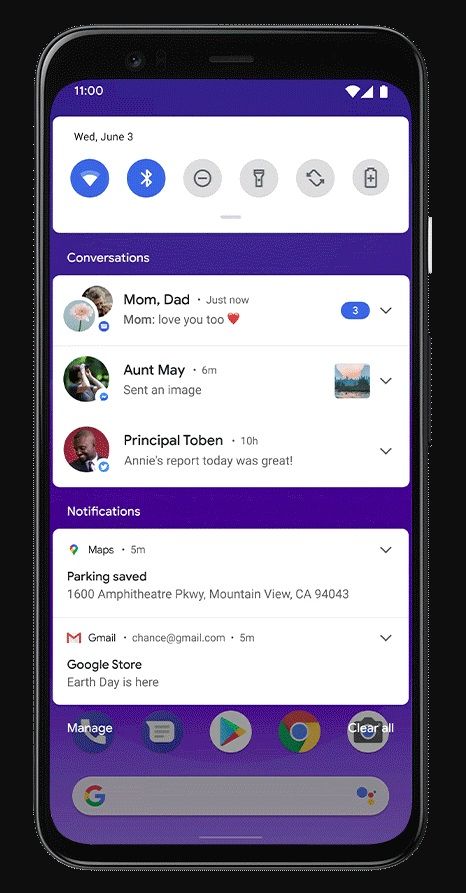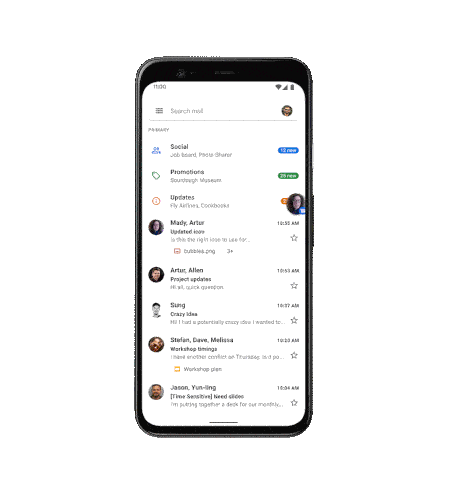Android 11 is now available in stable for Google Pixel phones and in beta for some OnePlus, Xiaomi, Realme, and OPPO phones
Android 11 is the latest update to the world’s most popular smartphone operating system, and the first set of stable builds are finally rolling out to support Google Pixel smartphones. We’ve gone through four developer previews (DP 1, DP 2, DP 3, and DP4) and three betas (Beta 1, Beta 2, Beta 3) to get to this point, and we’ve tracked every little detail along the way as best as we could. And now with the stable release of Android 11, we can finally look forward to Google’s vision arriving in the hands of consumers across the world!

Android 11 comes with a fair few changes, but Google is highlighting some of the major ones.
Communication on Android 11
Conversations section in the notification shade
Conversations across messaging apps are now moved to a dedicated space in the notifications section. This will make it easier to manage ongoing conversations with people, and not have these notifications drown out in the flood of miscellaneous app notifications. Google mentions that you can also prioritize conversations from key individuals if you so want. This conversation section was first present in Developer Preview 1.

Bubbles
Last year, we had pointed out how the Bubbles API introduced in Android 10 will replace the overlay API in a future Android version. With Android 11, Google is pushing developers of messaging and chat apps to make the transition to Bubbles to keep conversations in view and accessible when a user is multitasking on their phone.

As users, you can now respond to important conversations without having to switch back and forth between a messaging app and other apps on your phone.
Built-in screen recording
While you could take screenshots from the very early days of Android, you couldn’t really record the contents of your screen on Google Pixel phone without needing a third-party app. Android 11 for the Google Pixel finally adds a built-in screen recorder, so you can easily capture and share what is happening on your Pixel. You can record with sound from the microphone, from the device (internal audio), or both; and you can do this without needing any third-party apps.

The screen recorder within Android was first spotted in Android 10 Developer Previews, but the feature was not user-accessible in the stable release. It was spotted again in Android 11 Developer Preview 1, and the feature received more polish in Developer Preview 2.
Device Controls in Android 11
Power Menu Device Control
Android 11 gets a new power menu that allows you to quickly access your connected smart devices. Simply long-press the power button to reach the new menu and control connected devices like thermostats and smart locks with a tap, without needing to open multiple apps.

With this new addition, it finally feels that Google has brought the smartphone to the smart home!
Redesigned Media Controls
Media controls on Android 11 have been redesigned, now gaining a consistent spot in the Quick Settings menu. You can also quickly switch media playback to another device using a shortcut.


The new media player in the Quick Settings panel caused quite a stir when it was first spotted in Developer Preview 1. Over the course of development, the UI has been refined, and the feature itself has been upgraded with the ability to store up to five previous media sessions.
Wireless Android Auto
Android 11 now allows all devices to work wirelessly with Android Auto, as long as you have a compatible head unit or aftermarket receiver. We’re already heard about this change, and Google is confirming that wireless Android Auto will require support for 5GHz Wi-Fi networks. Consequently, some areas in the EU, Japan, and Russia will not have this function available because of specific requirements for 5GHz Wi-Fi being used in cars.
Privacy and Data on Android 11
One-Time Permissions
As the name implies, Android 11 allows users to grant single-use, one-time permission access to apps that request access to the device’s microphone, camera, or location. The next time that an app needs to access these device features, it needs to request those permissions once again.

The feature was first spotted in Developer Preview 1, and it allows the user to temporarily grant an app access to a permission so long as that app is in the foreground. Once the user navigates away from the app, the app loses access to that permission and must request it again. This is different from the behavior introduced in Android 10 in which users could grant the location permission to apps “while the app is in use.” One-Time Permission gives users even more control over sensitive permissions.
Permissions Auto Reset
The average user might not remember to revoke access to sensitive permissions after their use, so Android 11 will auto-reset all the runtime permissions of an app and notify the user if the app has not been used for “an extended period of time”. The app can request the permissions once again the next time the app is used.


This feature addition was first spotted in Developer Preview 3, and we’re glad to see it make its way to the stable release.
Google Play System Update — Project Mainline modules
One of the biggest changes in Android 10 for newly launched devices is the introduction of Project Mainline. The purpose of Project Mainline is for Google to take control away from OEMs of framework components and system applications that are critical to security and maintaining development consistency. Each Mainline module is encapsulated in either an APK or an APEX file and is updateable by Google through the Play Store. The user sees updates as a “Google Play System Update” (GPSU) on their device, and updates are released on a regular cadence as a train (ie. they’re downloaded and installed at the same time).
Google mandates the inclusion of specific Mainline modules, which at the time of Google I/O 2019, included 13. With Android 11 Developer Preview 1, Google mandated a total of 20 Mainline modules. Now, with Android 11 (starting from the Beta 1), Google has mandated a total of 12 Mainline Modules in addition to the ones present on Android 10. The total is now at 25 modules.
– APKs: Captive Portal Login, Documents UI, ExtServices*, Module Metadata, NetworkStack, Network Stack Permission Configuration, Permission Controller*, Telemetry TVP
— Mishaal Rahman (@MishaalRahman) July 9, 2020
Android Enterprise Changes
Android 11 brings some changes for Android Enterprise users, with the work profile now giving the organization’s IT department the tools to manage a device without monitoring their personal profile data or activity. The announcement from Google leaves out most of the details, but you can view the changes here.
Exclusive features for Pixel users
There are some new features reserved for Google Pixel devices, likely being made available through the closed-source Pixel Launcher, Device Personalization Services, and other Pixel-exclusive applications. Google mentions that supported Pixel devices will get additional tools to organize and manage the phone, like app suggestions based on daily routines, new actions for selecting text and images, and for screenshots.
Android 11: Download and Rollout
Android 11 will begin rolling out today in stable for all Pixel devices going back to the Pixel 2, but beta releases are also now available for select OnePlus, Xiaomi, OPPO, and Realme smartphones. The OnePlus 8, OnePlus 8 Pro, Xiaomi Mi 10, Xiaomi Mi 10 Pro, OPPO Find X2, OPPO Find X2 Pro, OPPO Ace2, OPPO Reno3 4G, OPPO Reno3 Pro 4G, and the Realme X50 Pro are the devices getting new Android 11 beta builds today.
Download Android 11 for Google Pixel devices
The Android 11 update should be arriving through an OTA update to your supported Google Pixel device. But in case it hasn’t, you can download Android 11 for supported Google Pixel devices from the following links, and sideload it very easily:
Google Pixels
| Device, Codename, XDA Forums | OTA | System Image |
|---|---|---|
| Pixel 2 (walleye) | Download Link | Download Link |
| Pixel 2 XL (taimen) | Download Link | Download Link |
| Pixel 3 (blueline) | Download Link | Download Link |
| Pixel 3 XL (crosshatch) | Download Link | Download Link |
| Pixel 3a (sargo) | Download Link | Download Link |
| Pixel 3a XL (bonito) | Download Link | Download Link |
| Pixel 4 (flame) | Download Link | Download Link |
| Pixel 4 XL (coral) | Download Link | Download Link |
| Pixel 4a (sunfish) | Download Link | Download Link |
GSI Downloads
| x86+GMS | Download Link |
| ARM64+GMS | Download Link |
| x86_64 | Download Link |
| ARM64 | Download Link |
You can track the other phones getting the update by visiting our Android 11 update tracker article. And if you’d like to take a peek under the hood, Google has also started uploading the Android 11 source code to AOSP. We’ll of course be digging into AOSP ourselves, so stay tuned for more news on Android 11!
What are your thoughts on Android 11? Have you tried it out on your device? Let us know in the comments below!
The post Android 11 is now available in stable for Google Pixel phones and in beta for some OnePlus, Xiaomi, Realme, and OPPO phones appeared first on xda-developers.
from xda-developers https://ift.tt/2ZldUlP
via IFTTT
Aucun commentaire: